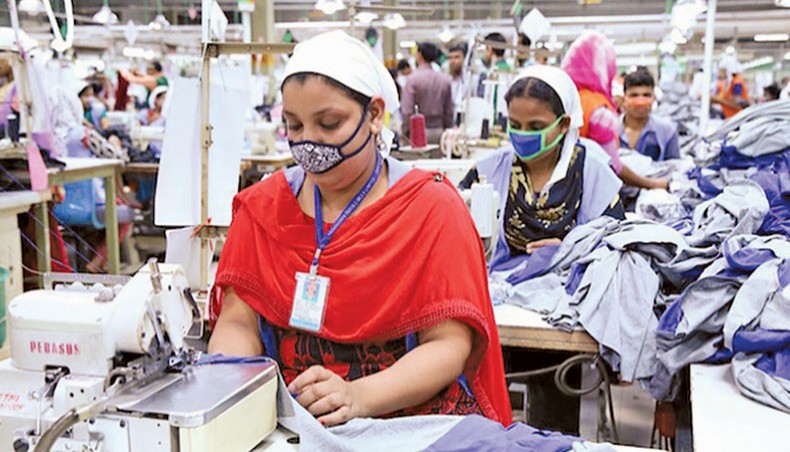
77pc RMG workers struggle to feed family members: survey

Seventy-seven per cent of the readymade garment factory workers in Bangladesh found it difficult to feed everyone in their household because of job loss or wage cut amid the coronavirus outbreak in the country, according to a recent survey.
The findings of the rapid survey, conducted by Brac University in association with University of California, on RMG workers in Bangladesh also said that 70 per cent of the workers were very worried or somewhat worried about workers in their factory who lost their job or might lose their job because of the pandemic.
The Mapped in Bangladesh project of Centre for Entrepreneurship Development of Brac University on Wednesday organised a webinar titled ‘COVID-19 Experience: Workers’ Perspective’ based on the findings of the survey.
The study showed that 77 per cent of respondents (80 per cent of women and 72 per cent of men) were in difficulties to feed everyone in their household while 69 of workers ate less meat, fish and eggs in May compared with February, but 40 per cent ate more pulses.
Among the 1,057 garment workers who participated in the phone survey, 906 workers who were still employed in February 2020, 140 reported that their current employers were laying off workers since March, 2020 after the pandemic broke out in Bangladesh.
Citing the July data from the Department of Inspection for Factories and Establishments, the survey said that 26,110 workers were dismissed, 14,132 were laid off and 1,55,010 were trenched since the onset of COVID-19.
As per the findings of the survey, 82 per cent of workers said that the income they had in April/May 2020 was less than the income in February 2020 and at the time of the survey, 52 per cent of the respondents said that they saved less than what they saved in February, the pre-COVID-19 period.
‘When asked how they have coped during this period, 60 per cent of workers (65 per cent of women and 55 per cent of men) said they did not save or use their savings to pay for food; 92 per cent (90 per cent of women and 96 per cent of men) said they reduced other expenses,’ data showed.
Sanchita Banerjee Saxena, executive director of Institute for South Asia Studies, University of California at Berkeley, presented the findings of the rapid survey at the webinar.
Opposing the data of jobless workers, Bangladesh Garment Manufacturers and Exporters Association president Rubana Huq said that a total of 70,000 workers from 106 RMG factories were retrenched from their jobs since the outbreak of the pandemic.
She said that the brands would have to be made responsible for the unwanted adversities that Bangladesh faced due to the COVID-19 outbreak.
‘Brands are always prescribing for all the compliances but then the sustainability pledge is absolutely absent in their sourcing equation,’ Rubana said.
She said that there was always a gap between sourcing practice and sustainability practice of buyers and this hypocrisy must end.
Rubana called for a collaboration of all groups to address the existing gap in the area.
Wahiduddin Mahmud, former caretaker government adviser, said that the factories of the RMG sector in Bangladesh were
born to export, which made the situation of the country very unique as a large number of the factories did export.
‘Thus, the ways the shocks have been absorbed by the garment sector of Bangladesh are different than the other parts of the world. As this sector has the highest concentration of workers it should be seen how to balance the public hygiene as much as possible,’ he said.
State minister for labour Monnujan Sufian said that the government had taken initiatives to open the garment factories amid the virus, keeping the welfare of the workers in mind.
She said that the government implemented its declared stimulus packages for the RMG sector, formed crisis committees, provided telemedicine services to workers and formulated health safety guidelines with the cooperation of the International Labour Organisation.
Taslima Akhter, president of Bangladesh Garment Workers Solidarity, urged the government and the factory owners to take their responsibilities for the workers, saying that they (workers) were facing constant fear of lay-off from their jobs.
The workers were the most vulnerable during this COVID-19 pandemic, she said.
Editor & Publisher: S. M. Mesbah Uddin
Published by the Editor from House-45,
Road-3, Section-12, Pallabi, Mirpur
Dhaka-1216, Bangladesh
Call: +01713180024 & 0167 538 3357
News & Commercial Office :
Phone: 096 9612 7234 & 096 1175 5298
e-mail: financialpostbd@gmail.com
HAC & Marketing (Advertisement)
Call: 01616 521 297
e-mail: tdfpad@gmail.com